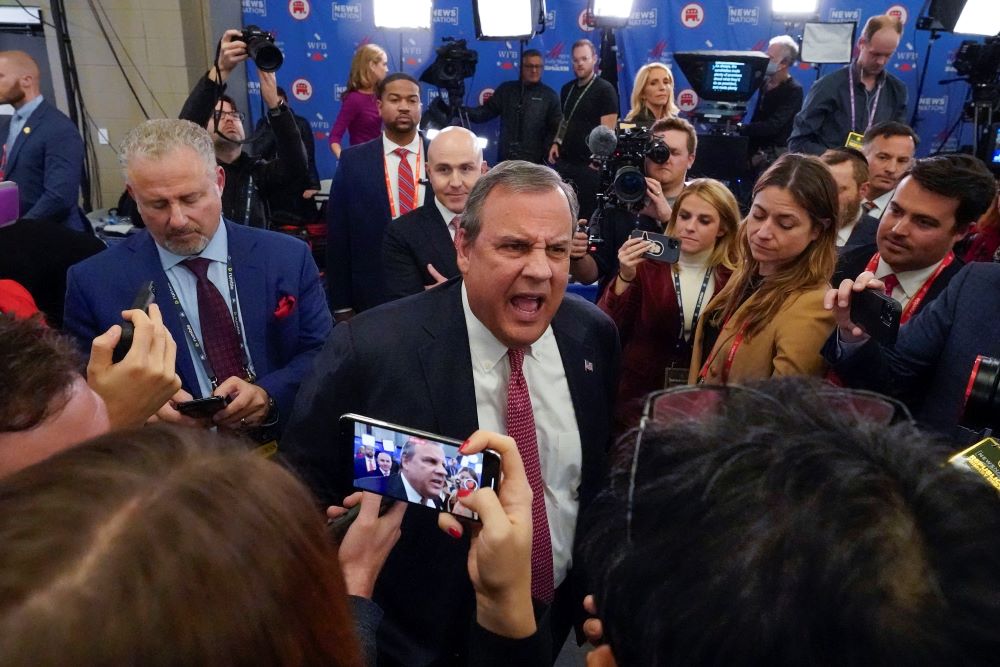
Audience members listen to former President Donald Trump speak during a commit to caucus rally on Dec. 13 in Coralville, Iowa. (AP/Charlie Neibergall, file)
Time to get out the crystal ball and look at what stories we expect to be following in 2024. Today, we'll look at the world of politics and the role of religion in politics, and on Friday we'll look at the life of the church.
The biggest story this year will be the U.S. presidential election, but that is actually several stories packed in a larger one. The willingness of Americans to defend democracy is the most consequential part: Former president Donald Trump activated a swath of previously disaffected and alienated voters, and they shifted states that had once been part of the Democrats' "blue wall," such as Pennsylvania, Michigan and Wisconsin, into the toss-up column. Other states like Ohio and Iowa, which were traditional toss-up states, are now solidly red. Democrats have a lock on the popular vote — they have only lost it once this century — but the Electoral College math remains challenging.
It is easy, and wrong-headed, for high-information voters to cast aspersions on these voters who had not voted in years but who turned out for Trump. The "diploma divide" is the principal fault line in American politics today, but not all the blame for Trumpism rests with the working class.
While Democrats were embracing Clintonian ideas about meritocracy, ideas that conveniently equated high levels of education (and the social biases that went along with being educated at elite universities) with merit, and throwing American manufacturing aside in the interest of globalization, the working class was getting screwed. Democrats claimed to be fighting for them. They still sang FDR's "Happy days are here again." Working-class voters may not have understood the macroeconomic issues, but they knew that their communities were being decimated by a variety of social pathologies starting with poverty and ending with the opioid epidemic. And they knew the great institutions of American life — our government, our political parties, our major universities, our large corporations — none of them were doing much to address their problems.
The working-class — and it is clear that it is no longer just the white working class, but Black and Hispanic, too — does not get a pass. They need to find better avenues of redress than Trumpian authoritarianism and racist diatribes.

President Joe Biden walks down the steps of Air Force One as he arrives Andrews Air Force Base after a trip to Milwaukee to deliver remarks on his economic agenda Dec. 20, 2023, at Andrews Air Force Base, Maryland. (AP/Evan Vucci)
Joe Biden is one Democrat who actually does identify with the struggles of working-class families and his policies have begun to address the gross inequality in wealth formation that has occurred in the past 40 years. Nonetheless, voters are sour on the economy, reminded about increased inflation every time they go to buy gas or groceries.
Biden got three pieces of good news as 2023 came to a close. Consumer confidence as gauged by the highly regarded University of Michigan survey jumped 13.7% between November and December. And the Federal Reserve announced it expected to make three cuts in interest rates in 2024, meaning consumers will pay less on their mortgages and less on their credit card bills. The United Auto Workers' successful strike not only earned its members a 25% pay hike, but other non-union automakers are now rushing to increase wages at their plants, too. Will it be enough? It is too early to tell.
It is proverbial wisdom in electoral politics that if the economy is bad, nothing else matters, but if the economy is good, other issues come to the fore. What else do Republicans have to run on? They have failed utterly to govern after winning control of the House in 2022. Culture war issues on which Democrats are vulnerable, at least when they sound like they just emerged from the faculty lounge, only work if the GOP sounds sensible rather than mean and their candidates mostly sound mean. The exceptions are former Govs. Chris Christie and Nikki Haley. The former has no real shot at the nomination, but Haley is closing on Trump in the New Hampshire polls. A December poll of Granite State voters conducted by American Research Group has her only four points behind the ex-president, 29% to his 33%.
The total number of people who read the bishops' quadrennial document on voting, "Forming Consciences for Faithful Citizenship," is probably smaller than the number of people in your bridge club.
The role of the courts in the upcoming elections is an issue at once fraught and without much in the way of precedence. Never before has the country been faced with the prospect of a nominee for the presidency facing a criminal indictment and Trump faces 91. If you watch Fox News, they claim this is an unprecedented effort by the Justice Department to interfere in the 2024 election. They are right about the "unprecedented" part. The problem, however, is not that Attorney General Merrick Garland is an overreaching partisan hack. The problem is that we never before had a president so indifferent to the rule of law as Trump.
Still, it is easy to see how many Americans will not take kindly to a court deciding an election — in advance! The U.S. Supreme Court shut down the legal recount in Florida after the 2000 election, effectively handing the presidency to George W. Bush. But that happened after the election. Do not look to the Supreme Court to get involved in politics before the election.
The only other outstanding issue, and it is both large and unforeseeable, is the president's age. Some days he looks great and other days not so great.

Republican presidential candidate former New Jersey Gov. Chris Christie speaking to members of the media in the Spin Room after participating in the Republican presidential primary debate hosted by NewsNation on Dec. 6 at the Moody Music Hall at the University of Alabama in Tuscaloosa, Ala. (AP/Gerald Herbert)
While the presidential race will capture most of the media spotlight, the contests for control of the House and Senate might prove just as important for the future of democracy. Already, a wave of resignations and retirements is changing the electoral math.
Both chambers are almost evenly divided. The Democrats face an uphill battle in their effort to maintain control in the Senate. Of the 33 regularly scheduled contests, Republicans have only 10 incumbents to defend while the Democrats have 20. Additionally, three Independents who caucus with the Democrats are up for reelection. Of these, Sen. Angus King in Maine and Sen. Bernie Sanders in Vermont are perennial favorites, but Arizona Sen. Kyrsten Sinema is running third in a three-way race and Democratic Rep. Ruben Gallego is ahead in most polls. Gallego is one of the most talented politicians of his generation and the sky's the limit for the Chicago-born former Marine.
All 435 seats in the House chamber are up for grabs and it is anybody's guess which party will come out on top. While the national temperament may govern the outcome in a general way, recent elections illustrate the degree to which considerations below the radar have a dramatic impact. For example, a series of mistakes by the New York State Democratic Party, especially a lack of financial support and organizational effort, led to the loss of four seats in the 2022 midterms.
The Catholic Church is unlikely to play any significant role in shaping the politics of the nation in 2024. The total number of people who read the bishops' quadrennial document on voting, "Forming Consciences for Faithful Citizenship," is probably smaller than the number of people in your bridge club. The bishops announced that abortion remained their "preeminent" concern this year, even though there are no federal elections in which the issue really will be affected by those elected. And when abortion restrictions come to a referendum, the pro-life side has lost every time.
The bishops have not been able to shift the increasingly anti-immigrant politics that has reared its ugly head, emboldening draconian policies proposed by the GOP and hobbling the Democrats from anything just. Comprehensive immigration reform, which seemed within our grasp a decade ago, is now a distant dream. Groups like the Hope Border Institute and Catholic Charities will continue to fight the good fight and achieve results on the ground, but achieving legislation that treats migrants with dignity is unlikely.
Advertisement
Climate change is another issue on which the Catholic Church could make a significant difference but, instead, efforts are scattershot and anecdotal instead of comprehensive and intentional. The 10th anniversary of "Laudato Si', On Care for Our Common Home" comes in 2025, and there is interest in rebooting it here in the U.S. But only the bishops can ensure the issue is brought to the parish level, and they have so far been disengaged.
The one area where we might see Catholic groups make progress is both relatively obscure and astonishingly important: developing nation debt. Working with organized labor, JubileeUSA almost succeeded in getting the New York legislature to pass legislation restricting the amount of money vulture funds can extract from sovereign debt negotiations. This might be the year they get the bill passed into law. Debt relief is also critical to the fight against climate change because resources currently going to pay off debt are needed to help poor countries convert to sustainable energy.
In every election, candidates will say something to the effect that "this is the most important election in our lifetime." In most years, those words are either hyperbolic or a bromide. In 2024, they ring true.








